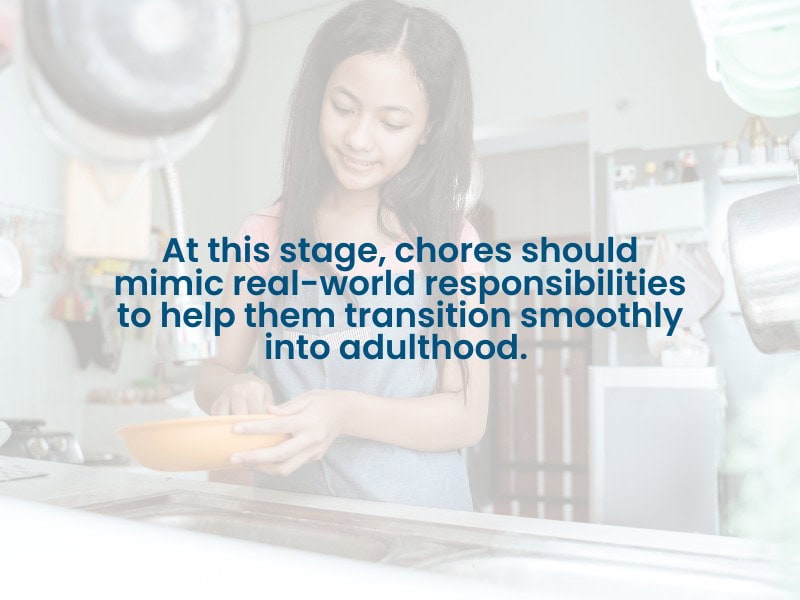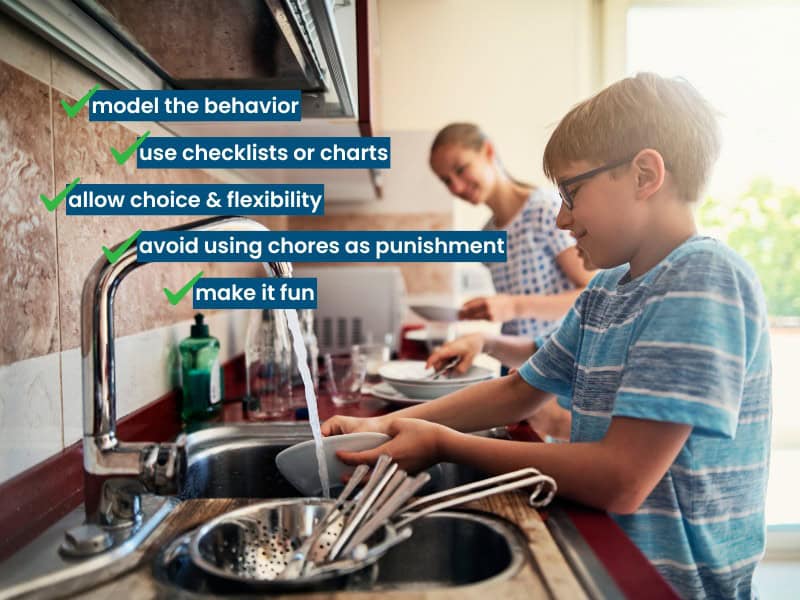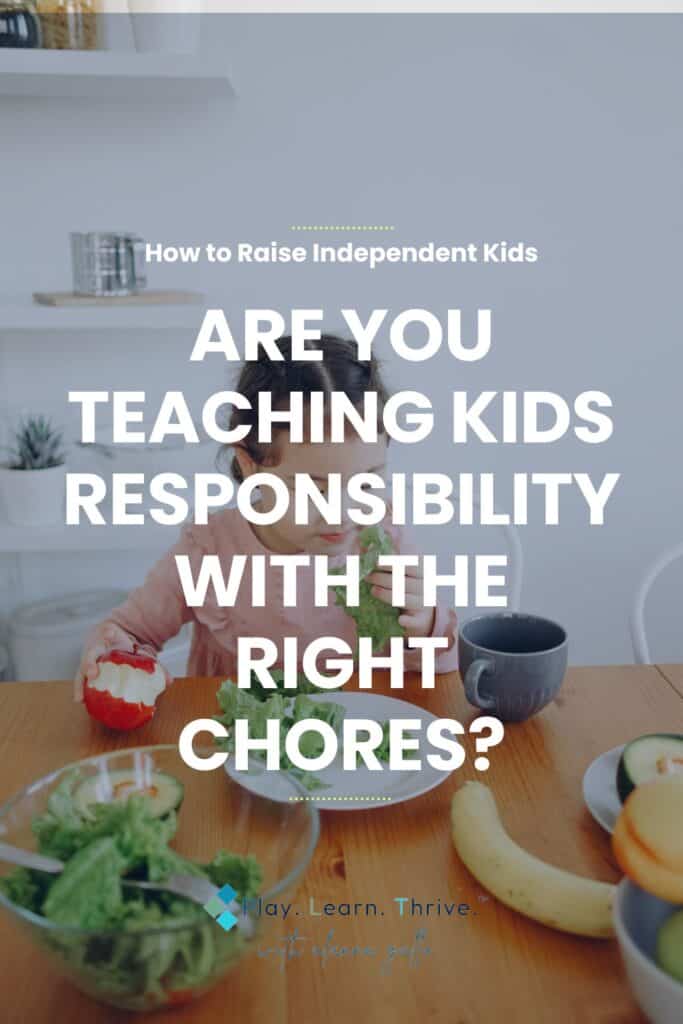Chores for Kids by Age: A Guide to Teaching Responsibility
Finding the right chores for kids by age is essential for helping them develop responsibility, independence, and a strong work ethic. Assigning age-appropriate chores not only contributes to a well-run household but also sets children up for success in adulthood.

Play. Learn. Thrive.™ only endorses products we authentically love and use. Some of the product links in this post may be affiliate links. That means that if you click them and make a purchase, this site makes a commission. Play. Learn. Thrive.™ is also an Amazon Associate. As an Amazon Associate, we earn from qualifying purchases. It will have no impact on the price you pay or the experience of your purchase.
Before we dive in, let me introduce myself! I’m Alanna Gallo, a former teacher with a master’s in education who saw firsthand how kids were losing confidence, independence, and their natural love of learning.

I left the classroom to help parents raise curious, capable, and screen-conscious kids in a world that doesn’t make it easy. My work has been featured in major media outlets, and I’m here to give you real, research-backed advice—without the guilt trips or unrealistic expectations.
Research shows that kids who regularly do chores grow up to be more responsible, resilient, and capable of handling real-world challenges.
The Long-Term Benefits of Chores
Before diving into age-appropriate chores, it’s important to understand why chores play such a crucial role in a child’s development.
- Builds Responsibility and Work Ethic – Completing tasks regularly helps children develop a sense of duty and follow-through.
- Encourages Independence – Kids learn self-sufficiency, an essential skill for adulthood.
- Teaches Time Management – Juggling school, activities, and chores prepares children for managing responsibilities later in life.
- Promotes Teamwork – Being part of a family means contributing to the household, which fosters a sense of community and collaboration.
- Instills Financial and Life Skills – As kids grow older, chores can transition into lessons about money management and real-world responsibilities.

Chores for Kids by Age Group
Chores for Ages 2-3: Toddler Years (Building the Foundation)
At this stage, toddlers are naturally curious and eager to imitate their parents. This is a great time to introduce simple, repetitive chores that foster early independence. The key is to keep tasks fun and engaging. Using positive reinforcement and making chores feel like a game will encourage participation.
- Put toys back in baskets or bins
- Place books on shelves
- Throw away trash
- Help feed pets (with supervision)
- Wipe spills with a towel
- Hand you items while unloading groceries
Key Tip: Use songs or playful encouragement to make chores engaging rather than a demand.
Chores for Ages 4-5: Preschool Years (Building Autonomy)
Preschoolers are eager to help and enjoy feeling like they are contributing. They can start taking on more structured tasks and should be praised for their effort rather than perfection. At this stage, patience is key—mistakes will happen, but the goal is to build habits, not perfection.
- Set the table (with lightweight items)
- Make their bed (it won’t be perfect, and that’s okay!)
- Water plants
- Sort laundry by colors
- Help put away non-breakable groceries
- Fold simple items like washcloths
- Feed pets (still supervised)
Key Tip: Give praise and use positive reinforcement. Avoid redoing their work—it’s about effort, not perfection!

Chores for Ages 6-7: Early Elementary (Developing Responsibility)
By early elementary school, children are capable of handling more responsibility and following simple multi-step instructions. They can take on chores that require some concentration and follow-through. Establishing a consistent routine at this stage helps reinforce responsibility and independence.
- Sweep small areas
- Dust furniture
- Wipe down counters and tables
- Match socks and fold small laundry items
- Empty small trash bins
- Make simple snacks (spreading peanut butter, pouring cereal)
- Help with packing their school lunch
- Load and unload the dishwasher (except sharp items)
Key Tip: Assigning a specific chore for a set time each day helps develop consistency.
Ready to Cut Back on Screen Time?

Our free Screen-Free Starter Kit gives you gentle, research-backed strategies to reduce screen time and reconnect with your child—without guilt, tears, or power struggles.
✨ Create a calmer, more connected home—starting today.
Chores for Ages 8-10: Upper Elementary (Mastering Daily Tasks)
By this stage, children should be contributing more meaningfully to household maintenance. They can handle tasks that require more skill and responsibility. This is also a great time to introduce chores that involve some planning, like meal prep or organizing a space.
- Vacuum or sweep floors
- Load and start the dishwasher
- Take out the trash
- Help prepare simple meals (scrambled eggs, sandwiches)
- Fold and put away laundry
- Walk pets (if safe to do so)
- Help wash the car
- Clean their bathroom sink and mirror
Key Tip: Allow kids to have a say in which chores they prefer; autonomy can improve motivation.
Chores for Ages 11-13: Preteen Years (Increasing Responsibility)
Preteens are ready for more independence and can begin to take on chores that require problem-solving and decision-making. They can also start managing personal responsibilities that prepare them for their teenage years. Providing incentives, such as extra privileges for completing tasks without reminders, can be effective.
- Mop floors
- Cook simple meals with guidance
- Clean bathrooms (sink, mirror, toilet, and tub)
- Do their own laundry
- Take out recycling
- Mow the lawn (if safe and appropriate)
- Babysit younger siblings for short periods
- Organize and declutter shared spaces
Key Tip: If an allowance is involved, tie it to extra chores rather than expected daily responsibilities to reinforce work ethics.
Chores for Ages 14-18: Teen Years (Preparing for Independence)
Teenagers should be capable of managing household responsibilities on their own. At this stage, chores should mimic real-world responsibilities to help them transition smoothly into adulthood. Encouraging them to take ownership of certain household tasks fosters confidence and self-sufficiency.
- Prepare full meals
- Do grocery shopping with a list
- Manage household cleaning schedules
- Handle their laundry completely
- Perform home maintenance (changing lightbulbs, unclogging drains)
- Run errands (if they have transportation)
- Babysit siblings or neighbor’s kids
- Manage their own budget and financial responsibilities
Key Tip: Encourage real-world accountability. Have teens cook dinner once a week or be responsible for a certain household duty without reminders.

How to Make Chores a Positive Experience
- Model the Behavior – Children are more likely to adopt habits they see modeled by parents.
- Use Checklists or Charts – Visual reminders help reinforce routines. I do not suggest using reward charts AT ALL as they decrease long-term internal motivation. However, a chart that allows children visually see their responsibilities is excellent.
- Allow Choice and Flexibility – Giving kids some say in their tasks improves buy-in.
- Avoid Using Chores as Punishment – Instead of making chores a consequence, present them as a normal part of life. I would advise against paying for chores, and for the same reason, I advise against reward charts. Daily chores are family expectations that are just a part of being a contributing family member.
- Make It Fun – Turning on music or racing against a timer are great ways to make chores more fun for the whole family. We also try to do chores together, especially when the children are younger than age 12. This helps keep them motivated and also helps in the development of executive functioning skills needed to tackle the chores without as much support eventually.

Chores are one of the simplest ways to set children up for long-term success. They teach responsibility, teamwork, and self-sufficiency—skills that will serve them well into adulthood. By introducing chores in an age-appropriate way, you’re helping your child build confidence and independence while strengthening your family unit.
So, next time your child complains about setting the table or folding laundry, remind them: these little responsibilities today are preparing them for a successful, capable future.
Enjoyed this post about chores for kids by age? Then you should also consider reading:
- How to Raise an Independent Child
- Helping Your Child Stay Organized
- How to Raise Emotionally Intelligent Kids
Inspired by this post? Be sure to subscribe download my free Screen-Free Starter Kit! For more insights and resources on raising confident, lifelong learners, be sure to follow me on Instagram – can't wait for you to join me!






